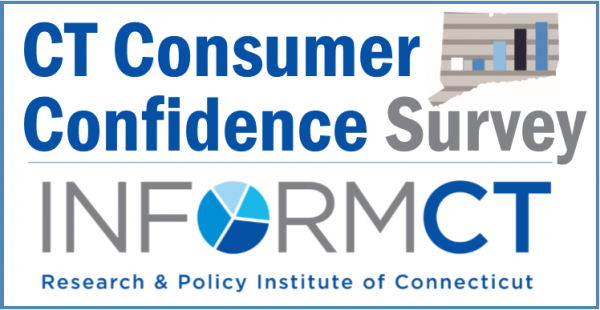State Economy Stagnating, Residents Have Less Optimism but Fewer Plans to Leave, Survey Shows
/Connecticut residents generally view the state’s economy as stagnating, even as a majority consider the state a good place to live and raise a family, and fewer residents say it is likely that they will move out of the state. According to the latest quarterly Connecticut Consumer Confidence Survey, those who view the Connecticut economy as improving has dropped by 10 points between the end of March and the end of September, from one-third of those surveyed (33%) to less than one quarter (23%).
An increasing percentage of state residents consider business conditions as having worsened during the past six months, and fewer think business conditions will improve in the next six months, as compared with the March survey. Only 22 percent believe that conditions have improved during the past six months, and 74 percent believe business conditions will stay the same or worsen during the next six months (53% stay the same, 21% worsen).
Administered for InformCT by the Connecticut Economic Resource Center, Inc. (CERC) and Smith & Company, the analysis is based on the responses of residents across Connecticut and addresses key economic issues such as overall confidence, reactions to housing prices, upscale consumer purchases, leisure spending and current investments. The research provides a measure of the strength of the Connecticut economy as well as a gauge of select economic factors, officials said.
Reflecting the diminishing consumer confidence in the state’s economy, the percentage who would make a major consumer expenditure has also dropped 10 points since the end of the 1st quarter – from more than 1/3 to just one-quarter (26%). Nine in ten state residents believe that there are not enough jobs in Connecticut or that jobs are very hard to get, and those percentages have nudged upwards through the year.
“A higher percentage of respondents have accepted the fact that business conditions “are what they are” and are not going to change soon. This feeling is also reflected in the ‘not improving’ job market,” said Alissa DeJonge, Vice President of Research at CERC.
Nonetheless, those who live in Connecticut are more inclined to stay, according to the survey. Those who say it is likely they’ll move out in the next 5 years has shifted dramatically between March and September. At the end of the first quarter, in March, there was an even split, 39%-39% on the likely to stay or go question. The latest data indicates that a 12 point differential has developed, with 46 percent saying it is unlikely (either somewhat unlikely or very unlikely) that they will move out in the next five years, and only 34 percent respond that moving is likely. The largest segment, one-third of those surveyed, say a move out of Connecticut is very unlikely.
The survey also found that a narrow majority agree that Connecticut is a good place to live and raise a family (51 percent), although the percentage who "strongly agree" has declined by 2 percentage points in each of this year’s quarterly surveys and now stands at 14 percent.
Among other economic indicators, the percentage concerned about being able to afford health insurance has edged up slightly, from 53 percent to 55 percent, those who anticipate refina ncing or purchasing a home in the next six months dropped from by one-third, from 18 percent in the first quarter of the year to 12 percent by the end of the third quarter. Interestingly, buying a car appears immune to economic outlook – the percentage who anticipate that purchase in the next six months has been nearly identical in each quarterly survey this year.
ncing or purchasing a home in the next six months dropped from by one-third, from 18 percent in the first quarter of the year to 12 percent by the end of the third quarter. Interestingly, buying a car appears immune to economic outlook – the percentage who anticipate that purchase in the next six months has been nearly identical in each quarterly survey this year.
“Many feel that they are worse off now than 6 months ago and this downward spiral may continue through the next 6 months,” added Stephen A. Smith, President of Smith & Company. “In addition, many do not feel that the Connecticut economy is improving and over half continue to express concern about their ability to retire comfortably.” In the survey, 55 percent indicated they do not believe they will “have enough money to retire comfortably,” up from 51 percent in March and 53 percent in June.
As the state moves forward with major investments in transportation, the percentage who believe traffic congestion is severe enough to justify tolls on major highways hasn’t budged all year – only one-quarter agree. The percentage of those who disagree has decreased slightly – from 56 percent to 50 percent, with 6 percent shifting to the “not sure” category between the first quarter and third quarter surveys.
InformCT is a public-private partnership that currently includes staff from CERC and the Connecticut Data Collaborative. CERC, based in Rocky Hill, is a nonprofit corporation and public-private partnership that provides economic development services consistent with state strategies, leveraging Connecticut’s unique advantages as a premier business location. Smith & Company LLC is a market research firm. More information about the survey, and subscribing, can be found at www.informct.org.






























